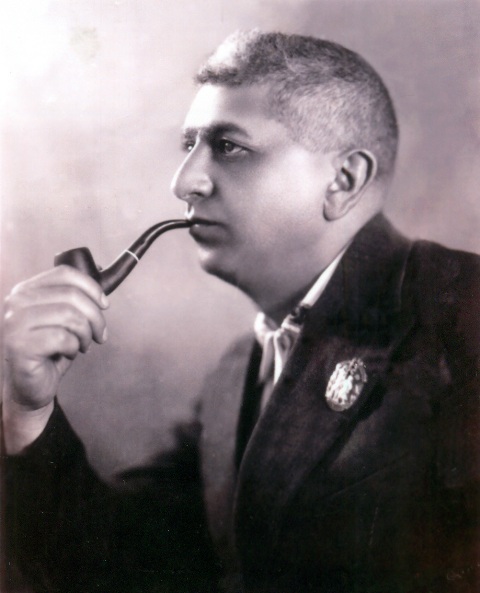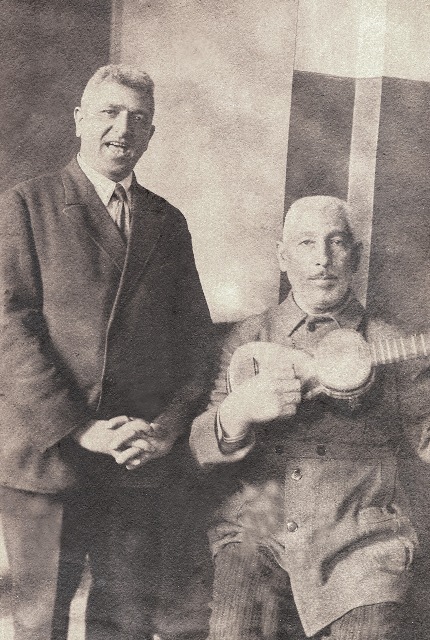Opera singer, actor Ali Abdul oglu Zulalov was born on September 13 (or March, April) 1893 in the city of Shusha. He was the nephew of the Azerbaijani singer Bulbuljan.
[Z.Zulalova. Devotee of Azerbaijani opera. 2008, p. 177]
[Encyclopaedia of Uzeyir Hajibeyov. 2003, p. 106]
[Azerbaijani Theatre Encyclopaedia. In three volumes. Volume I. 2016, p. 362]

In 1898, armenians decapitated Ali Zulalov’s father. After some time, Ali’s family had to move to the city of Ashgabat (Turkmenistan). Later, Ali returned to the city of Shusha, where he worked as a cobbler’s helper. Later, Ali Zulalov wrote in his memoirs:
“They murdered my father when I was 5 years old. I lived in Ashgabat for 4 years under my uncle`s (Bulbuljan) care.” At the age of 9, I returned to Shusha and worked as a cobbler’s helper.”
[Z.Zulalova. Devotee of Azerbaijani opera. 2008, p. 18;23;35]
In 1914 (1916), Ali went to Baku and got a job in the manufacturing shop of his relatives, the Valikhanovs.
[Z.Zulalova. Devotee of Azerbaijani opera. 2008, p. 27;87]
[“Vyshka oil” newspaper № 44 (20411) 19-25.11.2021., p. 11 (Article from “Vyshka” newspaper № 13. 2002]
Ali Zulalov took lessons from the Azerbaijani composer Uzeyir Hajibeyov. Bulbuljan played a big role in his education and formation as a singer-actor. In 1917(1925)-1952, Ali Zulalov performed at the Azerbaijan State Academic Opera and Ballet Theatre. However, in the book “Azerbaijani Theatre Encyclopaedia” (2016) states that Zulalov started performing on the stage in Shusha in 1917, and from the beginning of the 1920s to 1925 he acted in the musical performances of the Azerbaijan State Academic National Drama Theatre.
[Z.Zulalova. Devotee of Azerbaijani opera. 2008, p. 22;39;86-87]
[Encyclopaedia of Uzeyir Hajibeyov. 2003, p. 106]
[“Vyshka oil” newspaper № 44 (20411) 19-25.11.2021., p. 11 (Article from “Vyshka” newspaper № 13. 2002]
[Azerbaijani Theatre Encyclopaedia. In three volumes. Volume I. 2016, p. 362]
In 1920-1921, Ali Zulalov performed in touring concerts in different regions of Azerbaijan.
[Z.Zulalova. Devotee of Azerbaijani opera. 2008, p. 81;90]
In 1935 (1936) he graduated from the academy currently known as Uzeyir Hajibeyov Baku Music Academy.
[Z.Zulalova. Devotee of Azerbaijani opera. 2008, p. 81]
[“Vyshka oil” newspaper № 44 (20411) 19-25.11.2021., p. 11 (Article from “Vyshka” newspaper № 13. 2002]
According to the memoirs of Ali Zulalov’s daughter – Solmaz, they tried to arrest her father during Stalin’s repressions in the 1930s.
“According to my mother, they wanted to arrest my father in 1937. Thus, my father once came home in the morning. My mother was worried sick. When my father finally got home, his face turned pale, and it turned out that he was called to be summoned for questioning to NKVD (the People’s Commissariat of Internal Affairs of the USSR). After this incident, his heartaches began. At that time, after arresting people, they beated and tortured them, and then forced them to sign the documents. My father was a very proud person, so he did not sign any documents and did not agree to cooperate with any authorities.”
[Z.Zulalova. Devotee of Azerbaijani opera. 2008, p. 37-38]
Ali Zulalov was the first singer to perform the role of Ihsan Pasha in Uzeyir Hajibeyov’s opera “Koroghlu”. He also performed in the Russian composer Reinhold Glière’s opera “Shakh-Senem” (Haji Ahmed) and the following operas by Azerbaijani composers: Zulfugar Hajibeyov’s “Ashiq Garib” (Shahvalad), Uzeyir Hajibeyov’s “Leyli and Majnun” (Leyli’s father), Muslim Magomayev’s “Shah Ismayil” (Abu Hamza) and “Nargiz” (Mullah Mutallim).
There is a history of creation of the character of Mullah Mutallim in the opera “Nargiz”:
“Muslim Magomayev was in their (the Zulalovs`) house and once he saw how Zulalov prayed, he decided to write the character of Mullah Mutallim just for him. In fact, at first Ali Zulalov was a little offended by the genius composer and did not agree to play the role of Mullah by any means. However, as a result, of course he played this role, not only in Baku, but also in Moscow during ten days of Azerbaijani literature and art (1938)”.
Joseph Stalin, who was the leader of the USSR at that time, admired the image of Mullah Mutallim very much. During the performance, he said: “See how well he (Ali Zulalov) played the role of mullah.” Ali Zulalov was awarded the “Order of the Badge of Honour” for this role.
[“Vyshka oil” newspaper № 44 (20411) 19-25.11.2021., p. 11 (Article from “Vyshka” newspaper № 13. 2002]
[Z.Zulalova. Devotee of Azerbaijani opera. 2008, p. 60;81-83;85;94]

In the book “Devotee of Azerbaijani opera” (2008) written by Ali Zulalov’s daughter, pedagogue Zemfira Zulalova, it is noted that after the Azerbaijani opera singer and actor Ahmet Aghdamli, Ali Zulalov was the performer of the best female roles in the theater. Ali Zulalov was one of the best performers of the Gulchohra role in Uzeyir Hajibeyov’s opera “Arshin mal alan”.
[Z.Zulalova. Devotee of Azerbaijani opera. 2008, p. 81]
[“Vyshka oil” newspaper № 44 (20411) 19-25.11.2021., p. 11 (Article from “Vyshka” newspaper № 13. 2002]
On February 23, 1940, Ali Zulalov was awarded the title of Honored Artist of the Azerbaijan SSR.
[Encyclopaedia of Uzeyir Hajibeyov. 2003, p. 106]
[Z.Zulalova. Devotee of Azerbaijani opera. 2008, p. 97]
[Azerbaijani Theatre Encyclopaedia. In three volumes. Volume I. 2016, p. 362]
During the years of the Great Patriotic War (1941-1945), Ali Zulalov, accompanied by the Azerbaijani tar player Gurban Primov, frequently performed before the soldiers at the front. For these services, he received a medal “For the Defence of the Caucasus”.
[Z.Zulalova. Devotee of Azerbaijani opera. 2008, p. 85]
Ali Zulalov died on January 10 (February 18) 1963.
[Z.Zulalova. Devotees of Azerbaijani opera. 2008, p. 39]
[“Vyshka oil” newspaper № 44 (20411) 19-25.11.2021, p. 11 (Article № 13 from “Vyshka” newspaper. 2002]
[Encyclopaedia of Uzeyir Hajibeyov. 2003, p. 106]
[Azerbaijani Theatre Encyclopaedia. In three volumes. Volume I. 2016, p. 362]




